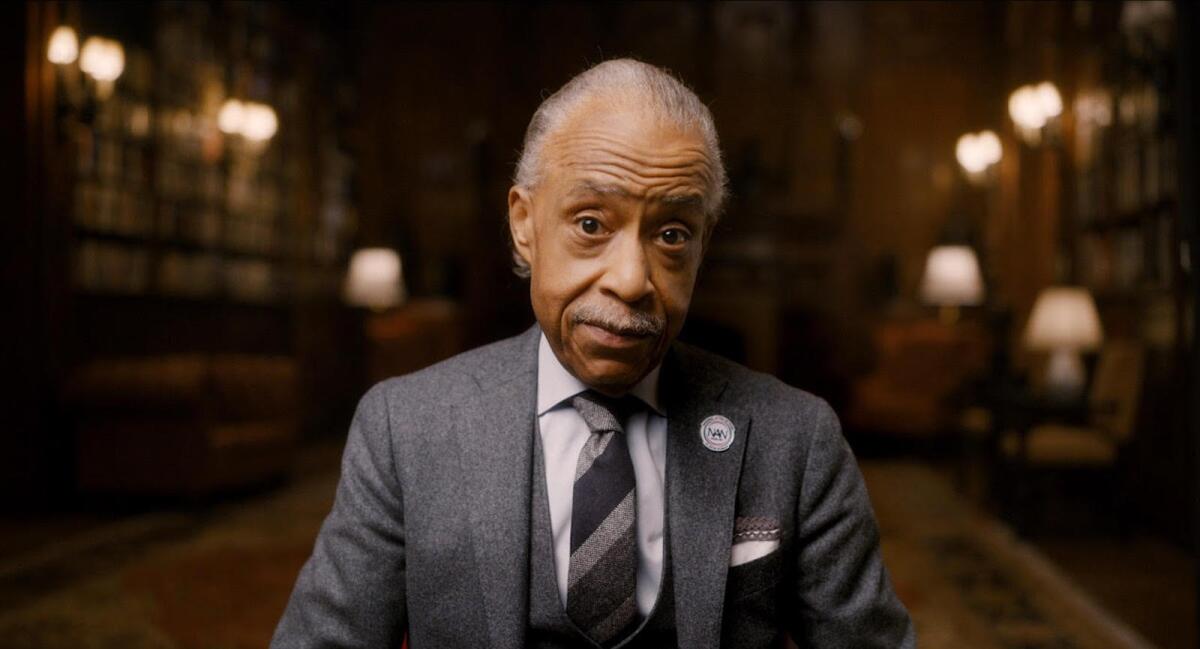Al Sharpton documentary ‘Loudmouth’ is a profile in one voice — his

- Share via
If anyone understands the power of media oxygen to stoke the fires of social justice — and, no less essentially, show where racism blazed freely — it’s the Rev. Al Sharpton. And because there’s always something to point out and shout about regarding institutional racism in America, the civil rights activist and MSNBC host with the unflappable demeanor has never been at a loss for words when in front of a lens and microphone.
“Loudmouth” is the wryly admiring title director Josh Alexander has given his documentary about Sharpton. And yet the thin man in the sharp gray three-piece sitting down for Alexander’s camera at the beginning looks more serene grandfather than warrior battle-hardened from the front lines of racial inequality, from his days as a youth director in the late ‘60s under the Rev. Jesse Jackson to eulogizing George Floyd at his funeral.
For your safety
The Times is committed to reviewing theatrical film releases during the COVID-19 pandemic. Because moviegoing carries risks during this time, we remind readers to follow health and safety guidelines as outlined by the CDC and local health officials.
Of course, the bountiful archival footage “Loudmouth” has to draw from — speeches, marches, protests, arrests, news footage, talk show appearances — reminds us of the story we know, that in the ‘80s and ‘90s the Brooklyn-born and -raised Baptist minister with the recognizably James Brown-ian perm was as prominent a figure in the push against racial injustice as anyone. He refers to himself as “Blowup man” early on, because he’s never denied the volume-raising, spotlight-hogging aspect of his job.
The way he puts it, the story of the lion and hunter is that “the hunter writes the story,” which makes Sharpton the one trying to shift the narrative when Black people are deemed unworthy of fair treatment in a system that prefers they be unseen and disposable. He established those rabble-rousing bonafides in Howard Beach in Queens in 1986 after 23-year-old Michael Griffith died because of a racially targeted attack by white youths. Sharpton kept up the pressure for a special prosecutor, and savvily planned marches through the area’s all-white neighborhoods that, when covered by the news, showed how virulently racist many residents were. At his most effective, Sharpton knew how to make the hunters the story.
As for the reverend being the story of his own biodoc, however, “Loudmouth” — even at two hours — isn’t too keen on filling in the details or shadings that provide a deeper portrait. There are no interviewees besides Sharpton, and while he’s up for defending his part in the reputationally bruising Tawana Brawley rape allegations case (he says the goal was only ever getting her day in court) and acknowledging that his rhetorical excesses needed some rehabilitating (thanks to advice from Coretta Scott King), what we’re left with is a long, fascinating life with curious personal and professional gaps. When Sharpton reads off a list of the many names and families he’s advocated for, the intent may be noting all the cases and tragedies and fights away from the media, proving he wasn’t all showboat. But not hearing from cohorts or anybody he helped — for once, it all really is about him — feels like a missing piece that could have given dimension to a portrait a little too comfortable with deference.
“Loudmouth” is better when it operates along parallel histories of strife and battle: galling incidents that expose America’s racial fault lines, and how Sharpton’s activism affected those spaces. At the very least, the documentary makes it clear that showing up and saying something is better than doing nothing, that sometimes the only tone to take when access to the megaphone isn’t a given is fever pitch.
It’s as sobering a prism as any through which to view a troublemaker’s life, what hasn’t changed, and what count as incremental victories. A year after Floyd’s funeral, Sharpton returned to the family to lead a prayer after Derek Chauvin’s murder conviction, and for once, he didn’t have to lead with bluster or fury — the lion from his metaphor allowing its roar to evoke eloquently measured hope, even if the hunted’s story was far from over.
'Loudmouth'
Not rated
Running time: 2 hours, 3 minutes
Playing: Laemmle Noho 7, North Hollywood; Cinemark Baldwin Hills Crenshaw; Regal Edwards West Covina; Regal Edwards Corona Crossing
More to Read
Only good movies
Get the Indie Focus newsletter, Mark Olsen's weekly guide to the world of cinema.
You may occasionally receive promotional content from the Los Angeles Times.










